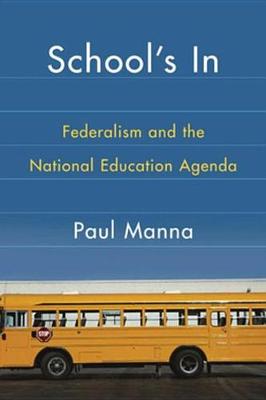American Governance and Public Policy
1 total work
For most of the history of the United States, citizens and elected officials alike considered elementary and secondary education to be the quintessential state and local function. Only in the past four decades, from Lyndon B. Johnson's signing of the landmark Elementary and Secondary Education Act of 1965 to George W. Bush's ambitious but controversial "No Child Left Behind" initiative, has Washington's influence over America's schools increased significantly. Today, many Americans have become more convinced that the U.S. government and the states should play an increasingly important role in the nation's schools.
In School's In, Paul Manna looks over forty years of national education policymaking and asserts that although Washington's influence over American schools has indeed increased, we should neither overestimate the expansion of federal power nor underestimate the resiliency and continuing influence of the states. States are developing comprehensive-often innovative-education policies, and a wide array of educational issues have appeared on the political agenda at the state and national levels.
Manna believes that this overlap is no accident. At the core of his argument is the idea of "borrowing strength," a process by which policy entrepreneurs at one level of government attempt to push their agendas by leveraging the capabilities possessed by other governments in the federal system. Our nation's education agenda, he says, has taken shape through the interaction of policy makers at national and state levels who borrow strength from each other to develop and enact educational reforms.
Based on analyses of public laws, presidential speeches, congressional testimony, public opinion, political advertising, and personal interviews, School's In draws on concepts of federalism and agenda-setting to offer an original view of the growing federal role in education policy. It provides insights not only about how education agendas have changed and will likely unfold in the future, but also about the very nature of federalism in the United States.
In School's In, Paul Manna looks over forty years of national education policymaking and asserts that although Washington's influence over American schools has indeed increased, we should neither overestimate the expansion of federal power nor underestimate the resiliency and continuing influence of the states. States are developing comprehensive-often innovative-education policies, and a wide array of educational issues have appeared on the political agenda at the state and national levels.
Manna believes that this overlap is no accident. At the core of his argument is the idea of "borrowing strength," a process by which policy entrepreneurs at one level of government attempt to push their agendas by leveraging the capabilities possessed by other governments in the federal system. Our nation's education agenda, he says, has taken shape through the interaction of policy makers at national and state levels who borrow strength from each other to develop and enact educational reforms.
Based on analyses of public laws, presidential speeches, congressional testimony, public opinion, political advertising, and personal interviews, School's In draws on concepts of federalism and agenda-setting to offer an original view of the growing federal role in education policy. It provides insights not only about how education agendas have changed and will likely unfold in the future, but also about the very nature of federalism in the United States.
